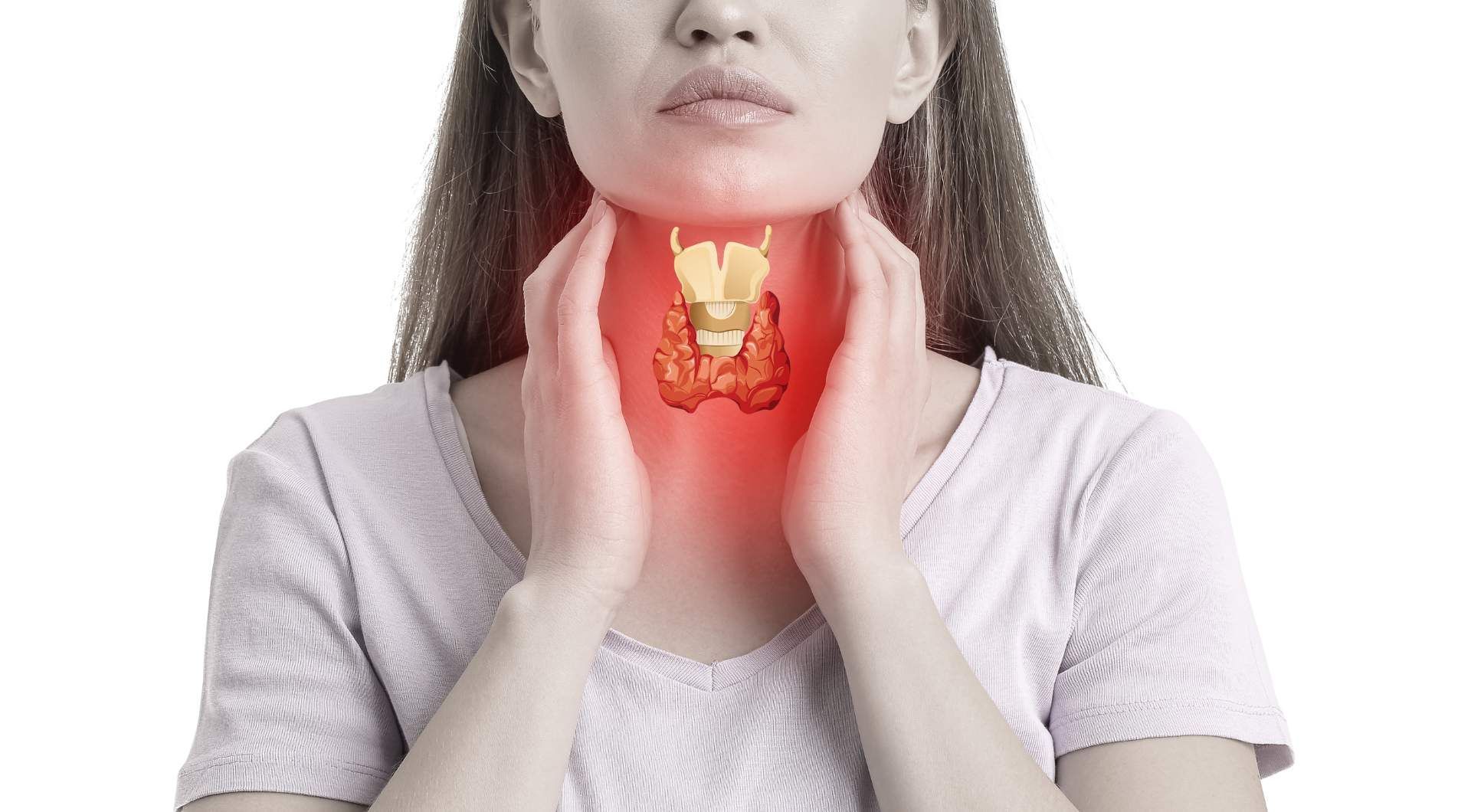Does Hypothyroidism Cause Anxiety? Demystifying Hypothyroidism's Impact on Mental Health
"The content below is not intended to be a substitute for professional medical advice, diagnosis, or treatment. Always seek the advice of your physician or other qualified health provider with any questions you may have regarding a medical condition."
You suffer from hypothyroidism.
But lately, you've been noticing that you’re unusually tense. You seem unable to relax, your breathing often feels out of control, and you’ve been avoiding social events.
It’s got you wondering, “Can hypothyroidism cause anxiety?”
Keep reading to explore the connection between your thyroid and your mental health, including the symptoms of anxiety caused by thyroid imbalance, and how to find relief naturally.
Table of Contents
- Can Hypothyroidism Cause Anxiety?
- How Can Hypothyroidism Cause Anxiety?
- What Does Thyroid Anxiety Feel Like?
- 7 Ways To Manage Anxiety Caused by Hypothyroidism
- When To See a Healthcare Practitioner for Anxiety Caused by Thyroid Imbalance
- Take the Holistic Path To Treating Hypothyroidism and Anxiety With HealthierU
Can Hypothyroidism Cause Anxiety?
It can.
Nearly five out of every 100 Americans suffer from hypothyroidism, while nearly 30% of Americans struggle with anxiety at some point in their lives.
Due to the nature of thyroid imbalances, anxiety, and
hypothyroidism often go hand-in-hand.
How Can Hypothyroidism Cause Anxiety?
The hormones in your thyroid are vital to the creation and regulation of your body’s neurotransmitters, including serotonin.
Serotonin is a naturally occurring neurotransmitter that carries signals between the nerve cells throughout your body. Low serotonin levels are linked to anxiety, depression, and mood disorders.
If your thyroid isn’t working properly, your serotonin levels can become erratic, potentially leading to anxiety and panic attacks.
And if you didn't previously know your thyroid isn't functioning correctly, feelings of anxiousness can be heightened by discovering you have a thyroid disorder.
What Does Thyroid Anxiety Feel Like?
Anxiety caused by thyroid feels much like other forms of anxiety. If you're suffering from anxiety along with hypothyroidism, your symptoms may include:
- Muscle tension
- Feeling “on edge”
- Racing heart
- Difficulty sleeping
- Irritability
- Poor concentration
- Changes in appetite
- Difficulty breathing
- Changes in bowel habits
- Sweating
- Nervousness
- Tremors
7 Ways To Manage Anxiety Caused by Hypothyroidism
#1: Exercise
Sometimes, the best way to curb anxious thoughts is to get your body moving.
Research has shown that people who get regular exercise are 25% less likely to develop anxiety within the next five years.
If you have hypothyroidism, it is best to focus on low-impact forms of exercise, such as:
- Walking
- Pilates
- Tai chi
- Gentle yoga
- Stretching
High-impact exercise places too much strain on your adrenal glands, which, if you have hypothyroidism, are already overly fatigued.
#2: Counseling
Visiting a counselor is another proven way to deal with anxiety caused by thyroid imbalance.
Different types of therapy can help you better understand why you are having anxious feelings and help you develop the most effective strategies for coping.
Cognitive behavioral therapy (CBT), for example, can help you learn different ways of thinking about anxiety-causing situations and give you tools for reacting to them in healthy ways. It may be just what you need to:
- Help you uncover the underlying causes of your anxiety
- Learn how to relax; and
- See situations in new, less frightening ways
Foods To Eat
#3: Mindfulness and Meditation
Mindfulness and meditation are two other proven ways to counter your anxiety-producing thoughts.
Regularly engaging in these deep breathing practices may help you focus on what passes through your brain and empower you to observe, evaluate, and replace those thoughts with something more positive.
Consider trying:
- Yoga
- Progressive muscle relaxation
- Guided imagery
- Breath awareness meditation
#4: Medication
If your anxiety is severe enough, your healthcare provider may talk with you about medication. If you think you might benefit from medication, there are several options to choose from, depending on your symptoms.
A few of the more common anxiety medications that might be recommended include:
- Selective serotonin reuptake inhibitors (SSRIs)
- Escitalopram (Lexapro)
- Fluoxetine (Prozac)
- Paroxetine (Paxil)
- Sertraline (Zoloft)
- Serotonin-Norepinephrine Reuptake Inhibitors (SNRIs)
- Desvenlafaxine (Khedezla, Pristiq).
- Duloxetine (Cymbalta, Drizalma, Irenka).
- Levomilnacipran (Fetzima).
- Milnacipran (Savella).
- Venlafaxine (Effexor).
- Benzodiazepines
- Alprazolam (Xanax)
- Chlordiazepoxide (Librium)
- Clonazepam (Klonopin)
- Diazepam (Valium)
- lorazepam (Ativan)
- Tricyclic antidepressants
- Clomipramine (Anafranil)
- Imipramine (Tofranil)
#5: Build Community
Often, people who are struggling with anxiety tend to isolate themselves from their loved ones or stop participating in their favorite activities. But this can only make matters worse.
Research has shown that staying connected socially can help you become more insulated and resilient to stress in the future.
If you find yourself dealing with anxiety caused by hypothyroidism, do your best to regularly spend time with your friends and family. And if they bring you joy, try to stay involved in your normal activities.
Engaging in socialization can cultivate feelings of togetherness, help relieve stress, provide laughter, and decrease your loneliness.
While each person is different, and some people experience social anxiety, keeping yourself plugged into your community and in as normal a routine as possible may help you manage your anxiety.
#6: Journal
If you have anxiety, you may struggle with trying to manage worrisome and intrusive thoughts.
Journaling is one way to help you cope with anxiety by allowing you to externalize what is going on in your brain. It enables you to put those thoughts into words and then set them aside rather than letting them continue to bounce around in your head.
Journaling can also often help you see the big picture — beyond the anxiety — and may be instrumental in revealing the light at the end of the tunnel.
Studies have shown that taking time to engage in regular journaling can have long-term benefits by helping reduce anxiety, depression, and other negative feelings.
Keeping track of your personal life and thoughts can also be beneficial if you choose to have counseling. It can help both you and your therapist zero in on what's causing your anxiety and what seems to help you feel better.
#7: Holistic Nutrition
What you eat really can make a difference when it comes to dealing with anxiety caused by thyroid imbalance.
Often, people struggling with anxiety find they have a decrease in appetite. But failing to consume enough calories causes stress from the feelings of hunger.
It can also result in a lack of essential vitamins and nutrients that are known to counteract the stress your body may be experiencing due to anxiousness. These include:
- Antioxidants
- Protein
- Vitamin B-6
- Magnesium
- Vitamin D
- Iron
- Omega-3
- Zinc
- Antioxidants
- Selenium
Certain foods may help support brain function and lower the severity of your anxiety, including:
- Eggs
- Salmon
- Green tea
- Dark chocolate
- Complex carbohydrates
And on the other hand, there are specific foods that may aggravate symptoms of anxiety. Try to avoid:
- Caffeine
- Processed foods
- Sugar
- Alcohol
When To See a Healthcare Practitioner for Anxiety Caused by Thyroid Imbalance
If the combination of hypothyroidism and anxiety becomes too difficult to manage on your own, it is time to visit a healthcare practitioner.
The symptoms to watch for include:
- Inability to get out of bed
- Lack of motivation
- Inability to perform job duties
- No longer enjoying former hobbies
- Thoughts of harm
The right doctor will be able to work with you to help monitor both anxiety and hypothyroidism.
Take the Holistic Path To Treating Hypothyroidism and Anxiety With HealthierU
The good news is that you don’t have to suffer from anxiety or hypothyroidism.
At HealthierU, in Brooklyn, NY, we take a holistic approach to treating all types of imbalances within your body.
Dr. Sergi has a deep knowledge of hypothyroidism and anxiety and the dynamics they create when combined. She works with patients to identify and deal with their anxiety and thyroid imbalances using natural remedies that include nutritious foods and natural supplements.
Request a nutrition consultation at HealthierU today!






